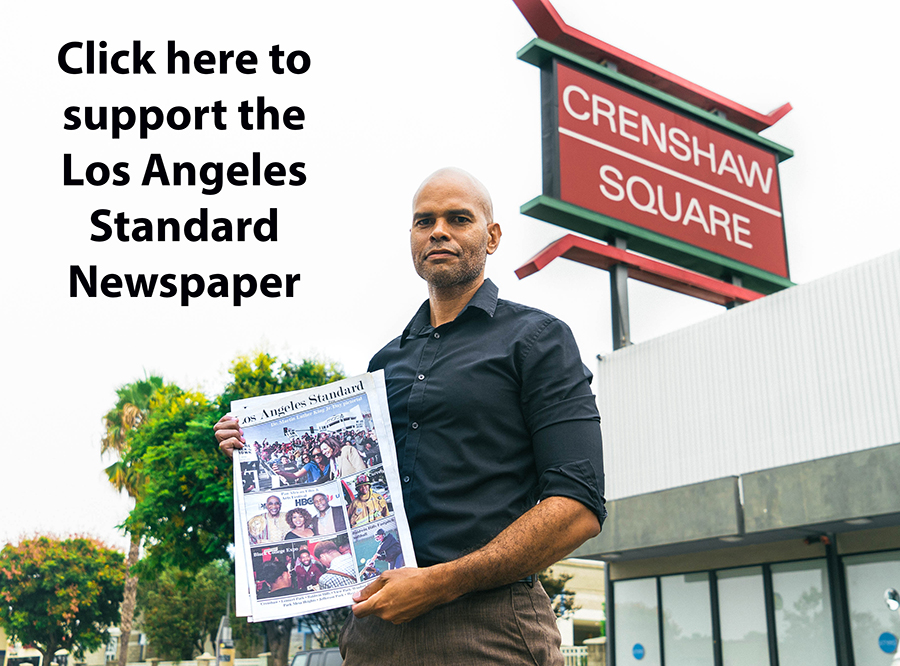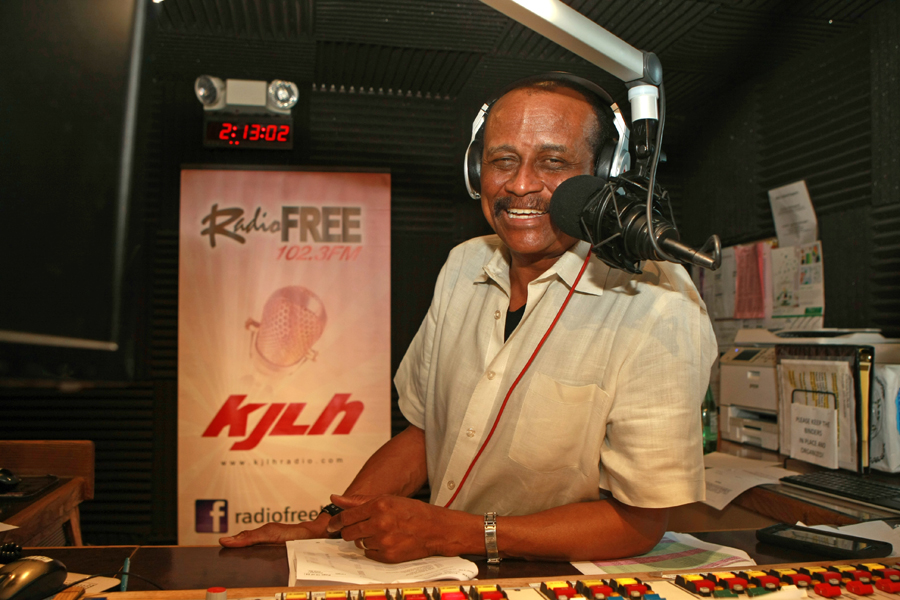It may seem like he’s having a party, but there is a lot going on beyond the mic.

By Jason Lewis
Lon McQ has been on the air at KJLH for 31 years, playing the top urban contemporary music and making people feel good while driving in their cars, in their homes, or at their jobs. His smooth voice combined with good music has endeared him to the greater Los Angeles areas.
While it sounds like he effortlessly puts people in the right groove, there are a number of layers to his job. When McQ is not talking into the mic, he is manning a switchboard that has a sea of colorful buttons, checking multiple computer monitors, and keeping his eye on the clock.
“People say, ’it’s a party in there, he ain’t doing nothing but playing records,’ McQ laughed. “Well I have to make it sound like a party. People don’t understand what being on the air really is. It’s three to four hours of total insanity. Because you’re talking to people that you don’t see. And these people are everywhere.”
McQ has the difficult task of creating a connection with people who are not in the room with him, and for people who for the most part he does not interact with.
“You’re creating a mood for people that you don’t see,” he said. “So you have to picture yourself in their cars. Or at work. Or maybe they’re out at the beach.”
Unlike many on-air radio personalities, at times he is a one man show as he takes on the engineer duties as well, which means that he has to have a great understanding of the equipment that he is using.
While he has carved out a lengthy career at KJLH, McQ had a long road just to get there. He is from Gary, Indiana, and his career in radio began because of a whim.
While serving his country in the Marine Corps, he was wounded in the Vietnam war. He was shipped to Guantanamo Bay in Cuba, where he was friends with a soldier who worked for the Armed Forces Radio. One night he was hanging out at the studio, and his friend let him play around with the radio equipment. After a quick tutorial, McQ started playing music and talking into the mic.
“I was talking over the records, just talking a whole bunch of junk,” he said. “But what I didn’t know was that I had accidentally hit the mic (live) button. So I’m doing all of this taping, and everything that I’m doing is going all over Guantanamo Bay.”
His friend had left the station while McQ was playing around with the equipment.
“So, it took him about 20 minutes to stop me, because it took him 20 minutes to drive from where he was to the radio station,” McQ said. “He walks in and he has this weird look on his face, and he said, ‘Dude, what did you hit?’ I said, ‘I don’t know, I’m just taping.’ He said, ‘You’re all over Gitmo (Guantanamo Bay).’
It wasn’t long before people started to react to what they heard on the radio.
“People were calling in because I was playing stuff like Isaac Hayes, Bobby ‘Blue’ Bland, I was playing all this stuff, and a lot of the people on the base really loved it,” McQ said. “They didn’t really hear that type of music. They heard country music and stuff like that.”
He was asked to come back the next week and try to recapture that moment, but that was easier said than done, because now McQ was performing while knowing that people were listening.
After completion of service from the Marine Corps, McQ attended Los Angeles City College, where he took classes in radio broadcasting, speech, and commercial writing. From there he created audition tapes and sent them to many radio stations. But he did not have much success in the beginning.
“I had a drawer filled with rejection letters,” he said. “But I kept sending out my audition tape.”
Eventually he was contacted by KLOM, a radio station in Lompoc, which is north of Santa Barbara, for an interview.
“So I go out there, walk into the station and I tell the Caucasian lady sitting at the desk that I’m Lon McQ,” he said. “She looks at me like she saw a ghost because she had never seen an African American audition at this particular station.”
After a good interview, McQ was not called back. After a few weeks he contacted the station, and he was given the job over the phone. A few months after taking the job, he was having drinks with his manager, and he heard some pretty surprising news.
“I didn’t think that you guys would ever call me,” McQ told the manager. “He said, ‘We were always going to call you. It wasn’t that we didn’t want to hire you, it was that you’re a black guy, breaking into a predominantly white market. We were trying to find somebody, who didn’t have to be better than you, but they had to be white and just come close to your abilities.’”
That reconfirmed a thought that a lot of black people have always known. That a black person cannot simply be better, or as good as a white candidate, they have to be clearly better to get the job. It also told McQ that he was very good at his profession.
After breaking into the business in Lompoc in 1979, McQ went on to work at KRQK in Lompoc and KACE in Inglewood before he heard that KJLH was hiring.
“I sent in my audition tapes, and 31 years later, here I am,” he said.
One of the high points of McQ’s career happened early on during his tenure at KJLH, when he met the station’s famous owner for the first time in 1984.
“I see this young man get out of a Rolls Royce, and I’m like, ‘that looks like Stevie Wonder,’ McQ said. “A few minutes later he walks in the studio and says, ‘Hey Lon, nice to meet you.’ I was shocked. He almost had to do the show for me. He actually did the show with me. It was a high point to meet him, and it’s been a high point working for him. Because he’s about the community. He’s about the music.”
Over the course of 31 years, McQ has worked his way up the ranks at KJLH while continuing to be an on-air talent. He is currently the operations manager at the station.
“I worked my way all the way up from the ground level to executive management,” he said. “And I’m still on the air. A lot of times in major market radio, operations managers are not on the air. So I get a chance to see both ends. I see what the air talent is going through, I know what management is requiring, and I’m right there in the middle.”
McQ became a voice for the community during the 1992 Riots, when KJLH’s headquarters was on Crenshaw Blvd. and 39th St.
“We were right in the middle of a combat zone,” he said. “Buildings were going up in flames. Police were coming in wearing riot gear. They were shutting down streets. Later that evening we suspended our music format and we went into a talk format, letting the community vent; letting them express their feelings about the verdict; letting them say what’s going on in their area. They were kind of giving us a visual from the radio of what was going on on Arlington Avenue, on Cimarron Street, on West Boulevard.”
The talk format lasted a few days, relaying vital information that the people stuck in the riot areas needed.
“We gave them information about what grocery stores were open, where they could get their checks cashed,” he said. “Because everything was shut down. Total pandemonium. Within this area people relied on us to get information about what they could do and what they couldn’t do. Where they could go and where they couldn’t go.”
For McQ, the riots gave him flashbacks to the Vietnam War.
“Because of the roadblocks we had a hard time getting home,” he said. “I knew a couple of African American police officers and they said, ‘Go this way, go that way, but don’t stop. Keep going.’ For a war vet, I’m like, the only thing different about this is that instead of places being called Quang Tri, Que Son, Phnom Penh, A Shau Valley, now places are being called Crenshaw Boulevard, Adams Boulevard, Degnan Boulevard, King Boulevard… Los Angeles.”
Most of McQ’s other experiences while being an on-air personality have been much more positive, and he has enjoyed a certain level of celebrity status. He hosts events such as concerts and jazz brunches, and he runs an online jazz station, www.McQsjazz.com, out of his home. The station is heard in over 25 countries.
McQ rides in the Kingdom Day Parade every year, and he is involved with the Leimert Park Business Association. Throughout his professional career, he has shown that he is much more than a voice who plays hit records, he is a staple in the community.
Tune into McQ’s KJLH show on 102.3 FM, from 1-4 p.m.









